
The Scholarship recipients 2019 Information is from the applications Each student received an award of $7,500.
Keru Cai, UC Berkeley, Comparative Literature
"Poverty and Squalor in Modern Chinese Realism (1918-1937)" She has designed, led, and taught courses in reading and composition, literature, and Chinese language at Cal. She noted, "I encourage my students to reflect upon how the texts we read shed light upon . . . cross-cultural dynamics today, for it is my earnest belief that teaching this material . . . is itself a form of activism."
Her professors commented on how hardworking she is and how well she writes and teaches.
Keru writes: "My research focuses on Chinese fiction produced in the early decades of the 20th century, . . . when Chinese activists and intellectuals, reeling from decades of political and military setbacks since the Opium Wars, sought to drag Chinese society out of an allegedly benighted, feudal backwardness into an enlightened, westernized modernity. Rejuvenating Chinese cultural production . . . according to Western models was considered a primary means of reinvigorating Chinese society and redefining Chinese national standing amongst hegemonic world powers. . . . My research explores how the painful consciousness of Chinese backwardness in comparison to the West was frequently written as narratives of material poverty and bodily squalor. . . . I contend that writing about poverty enriched the nascent modern forms of Chinese literature, breaking with a literary and linguistic tradition that for thousands of years was largely the purview of the ruling scholar-official class. . . . I thus challenge prior scholarship that emphasizes the alleged limitations rather than the manifold innovations of modern Chinese realism."
Here is my site: https://complit.berkeley.edu/people/graduate-student/keru-cai
Abrar Choudhury, UCSF, Medicine/Biomedical Sciences
Abrar studies tumor biology and is particularly interested in understanding the genetic basis of cancer. His background and skills combine medical knowledge, data informatics, and molecular biology.
He writes: "DNA, the genetic code that tells each of our cells how to function, can be modified to influence whether or not specific portions of the DNA are active. . . . I am studying how one type of DNA modification, the addition of methyl groups (also known as methylation), influences meningioma, the most common primary intercranial tumor. Meningiomas are primarily treated with surgery, but some tumors can regrow even if all the visible cells are removed. Doctors calculate the number of dividing meningioma cells to predict if the tumor will come back. Unfortunately, the number of dividing cells does not give the entire picture.The reasons those cells are dividing may be different in each. . . . The specific cell of origin that gives rise to meningioma is an open question in the field, and my research, for the first time, suggests that different meningiomas either arise from or mimic different cell types. This in turn may explain why different meningiomas have varying likelihoods of recurrence and could help doctors better tailor the aggressiveness of treatment needed for patients. . . . Armed with this knowledge, we can develop targeted medications, minimize risk of recurrence in patients, and forgo unnecessarily aggressive treatments."
His professors explain that "what sets Abrar apart is his curiosity to learn from different domains of science and his ability to apply this knowledge in unique ways." He is "on track to become a star physician scientist."
Melissa Cronin, UC Santa Cruz, Ecology & Evolutionary Biology

Melissa was unable to attend. She is studying overfishing and fisheries bycatch. At present, she is focusing on manta rays and devil rays, which are severely threatened by bycatch in the global tuna fleet. In addition to this research, she has developed a workshop and short course on preventing harassment in field settings.
Melissa writes: "My research seeks to make tangible improvements in seafood sustainability . . . by reducing the impact of fisheries on threatened and endangered marine animals, while still maintaining fisher livelihoods. For many threatened marine animals, overfishing and bycatch . . . are the most widespread and direct driver of population. I am conducting a field study in the Gulf of California to characterize the threat of bycatch on mobulids in artisanal fisheries. Working with a community of small-scale fishermen in Baja California Sur, we have been tagging devil rays live-released from artisanal fishing nets. This study will the the first ever to quantify the impact of bycatch mortality on mobulids in small-scale fisheries, an important puzzle piece to understanding the overall impact of fisheries on these species. . . . My research seeks to bridge the gap between sound, hypothesis-driven science and effective, interdisciplinary management for fisheries resources that matter to human communities, from small to large scales."
My website is: www.melcronin.com. I also use twitter for scientific communication, my name is @melissa_cronin.
She had a career as a science journalist before returning for her Ph.D. Many of her publications are available at https://melcronin.com/recent-work/
In addition to applauding her research, her professors emphasize her strong teaching and writing skills.
Natalia Duong, UC Berkeley, Theater, Dance, & Performance Studies
"Chemical Diasporas: Aesthetic, Legal, and Cultural Performances of Agent Orange"
Natalia is investigating "the multiple ways Agent Orange shapes legal, cultural, and aesthetic realms, . . . bringing attention to the . . . impact of toxicity on a transspecies ecology of plants, human, and nonhuman animals."
She writes: Agent Orange "has been described as the 'last significant ghost' haunting the normalization of U.S.-Vietnam relations since the stated end of the Vietnam War in 1975. Less discussed . . . is the international deployment of Agent Orange, its continued transnational effects, and the ongoing involvement of other countries in the creation, deployment, and remediation of the chemical compound. . . . My research contributes to performance studies by shifting the scale of 'bodies' usually studied to also include cellular and microscopic entities, and it uniquely challenges the environmental humanities to consider how contamination can create networks of care, not only landscape degradation. I also challenge disability studies to broaden its perspective to transnational contexts to consider how histories of racialization, colonial warfare, and empire disable various communities over time."
She was assistant director for Vietgone, one of the plays presented by American Conservatory Theater in San Francisco this season.
Her professors call her "simply stellar" and note that she is "the most articulate, nmost nuanced thinker in the room."
Adrienne Epstein, UC San Francisco, Epidemiology & Translational Sciences (Hendess award)
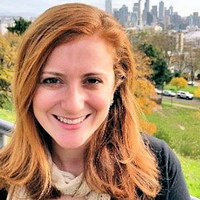
Spatial modeling of infectious diseases"
Adrienne is studying malaria in Uganda, trying to "quantify the denominator for incidence of the disease."
She writes: "Malaria is a major contributor to global morbidity and mortality, with 219 million new cases and 435,000 deaths in 2017. The United Nations has set forth the Sustainable Development Goal of ending the malaria epidemic by 2030. In order to track progress toward this target, countries must measure the burden of malaria accurately over geographic space and time. Accurate measures of malaria cases are also crucial for targeting regions and populations that are at high risk and evaluating the impact of control interventions, such as mass distributions of mosquito nets and indoor residual spraying of insecticides. . . . My work is in Uganda, a country with a remarkably high burden of malaria and a vital need for accurate measures of malaria burden. . . . The first aim of my research is to quantify the denominator for incidence around 35 public health facilities across the country. . . . Once I have generated measures of malaria incidence around these sentinel sites, an important question is whether I can use these estimates to draw inferences to the rest of the country where information is lacking. To do this, I will generate high-resolution risk maps. . . . This research will provide valuable insights on the burden of malaria in Uganda and permit the country to track progress. . . . I propose methods that efficiently leverage information that is inexpensive to collect and strengthens local health systems, and expect that these results will inform decision making and maximize resource allocation in Uganda."
She has also studied child undernutrition in East Africa. Generally, she is interested in the dynamics of vector-borne infectious diseases and the health effects of climate change.
Her professors note that she is "extremely talented [and] utterly tenacious" and has "outstanding potential as a researcher and future leader inn her field."
Steven Foley, UC Santa Cruz, Linguistics (Gilliland award)
Steven's research focuses on Georgian and Zapotec, languages with properties quite different from those of more studied languages. Such research is crucial for "refining our understanding of grammatical diversity and, by extension, our understanding of how the human mind produces and comprehends language."
His research "asks questions about how the forms available in a language relate to the meanings speakers wish to express." Georgian, his primary language of research, "has a great deal of flexibility in its word order and richness in its verbal inflection system, and so it is an ideal language to ask the questions about how form and function are linked." He has also investigated "the complex networks of facts and constraints that surround the strategies a language provides for asking questions and forming relative clauses." Since Chomsky's work in the 1970s, linguists have amassed much evidence that these processes are "considerably uniform across languages." Steven's study of Georgian "challenges this consensus in provocative ways." Inasmuch as Georgian has many more types of relative clauses than English, it provides an opportunity to test whether certain cognitive processes that we believe to be universal truly are universal. His research truly breaks new ground.
According to his professors, he "is theoretically astute, reads widely, writes beautifully, and analyzes very thoughtfully." He is also "a thoughtful and diplomatic person."
My website is here: https://people.ucsc.edu/~srfoley/index.html
Stefan Lemke, UC San Francisco, Neuroscience
Stefan is studying interactions across brain regions in hopes of understanding the healthy brain and treating the injured brain. Some of his work now focuses on the brain rhythms that occur during sleep.
He writes: "The deceptively simple act of reaching and grasping an object requires the precise coordination of both 'gross' movements of the arm and 'fine' movements of the fingers. Each of these distinct body parts . . . plays a different role in the action and has distinct complexities in its control. . . . I am investigating the role of interactions between the motor cortex and the subcortical striatum in the context of both motor skill learning in the healthy brain and the recovery of motor function after brain injury. . . . I am also studying the underlying mechanisms that drive plasticity across brain regions. . . . I have found evidence that motor skill learning does, in fact, require specific brain rhythms that propagate across both motor cortex and striatum during sleep and that these rhythms may underlie inter-area plasticity. . . . Altogether, I hope my work champions new approaches to studying the brain and establishes that the interactions between brain regions are central to the brain's function."
His professors note his "creativity, perseverance, and skills as a communicator."
Ryane Logsdon, UC Davis, Animal Behavior Graduate Group
In studying the Greater sage-grouse, Ryane is investigating the behavioral decisions animals make that affect their fitness. In "developing and utilizing novel methodologies and technologies, [her] work expands our ability to study wild animals in their natural environments." That latter prepositional phrase is important.
She writes: "Every day, animals make behavioral decisions that impact their fitness. These decisions are dependent on the information they possess, information available to them through both their social environment and habitat. . . . My dissertation investigates how variation in social and structural environments influences critical, fitness-related behavioral decisions in free-living individuals. . . . For this work, I use the Greater sage-grouse as a model organism. . . . My experiments utilize robotic female sage-grouse to control the social environment and elicit courtship behavior in males. My work is the first to use the newest iteration of these robots, which move freely across the lek [display grounds] and can adjust their head and body posture. . . . Additionally, the dissertation investigates the influence of habitat structure on courtships--how males respond to social information about female presence in varying habitats. . . . This research integrates theories from economics and game theory into the field of behavioral ecology, as well as broadens the field of communication to include habitat structure and information flow. Additionally, as sage-grouse are a declining species with ongoing, habitat-altering management attempts, my research has the potential to inform current and future conservation policies."
In addition to her research, she has been the student representative to the admissions committee for the Animal Behavior Graduate Group and has done "a prodigious amount of undergraduate mentoring."
Her professors call her "intelligent [and] innovative, [an] ambitious researcher and a gifted mentor and teacher."
Mashail Malik, Stanford, Political Science
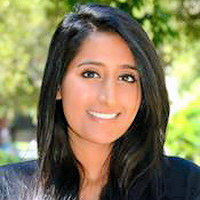
Mashail was unable to attend. She is pursuing dissertation research in "the diverse megacity of Karachi, Pakistan." She is there now. She questions why politicians from ethnic political parties continue to be re-elected despite being corrupt and ineffective at delivering on promises made to their constituents. She combines "ethnographic fieldwork, carefully collected survey and electoral data, and interdisciplinary theoretical insights drawn from a combination of political science, sociology, and social psychology" studies.
Her fascination with this topic "began quite selfishly . . . [Her] father was severely injured and nearly killed in a suicide bombing in Peshawar, Pakistan," where she was visiting her family between her freshman and sophomore years.
Her professors write that her approach to this topic "both creative in conception and innovative in method" and call her "extremely bright, broad-ranging, and intellectually ambitious."
Araceli Serrano, UC Santa Cruz, Earth Science (Norall award)
Araceli studies groundwater, concentrating on developing a managed aquifer. A previous project assessed post-remediation conditions at the New Idria mercury mine, "a designated ecological superfund site." As part of her outreach efforts, she leads workshops for elementary and middle-school girls interested in STEM.
In her research project, she investigates "the changes in water quality that can occur during managed aquifer recharge (MAR), a strategy being applied increasingly across California (and much of the western U.S. and other parts of the planet) to enhance and secure groundwater supplies." The impacts of MAR on water quality are poorly understood. She writes: "My lab helps develop and monitor a few MAR sites in collaboration with the Pajaro Valley Water Management agency in Watsonville, California, a primarily agricultural region whose groundwater supply is also at risk of sea water intrusion. One 3-acre MAR site has been partially amended with wood chips and instrumented with piezometers and real time water pressure probes to monitor and collect water. . . . [In addition], sediment cores were extracted from sites in central coastal California with sonic drilling technology. . . . Microbial DNA analysis will be used to characterize different microbe strain abundance, before and after both sets of laboratory experiments. This multidisciplinary approach has not been used in the field before and will yield significant results that can affect the way water management agencies approach groundwater supply and quality."
According to her professors, her project "is at the cutting edge of water resource management"; she has "consistently demonstrated her prowess as student and researcher"and is "an independent problem solver."
Emma Steigerwald, UC Berkeley, Environmental Science, Policy, & Management (Reed award)
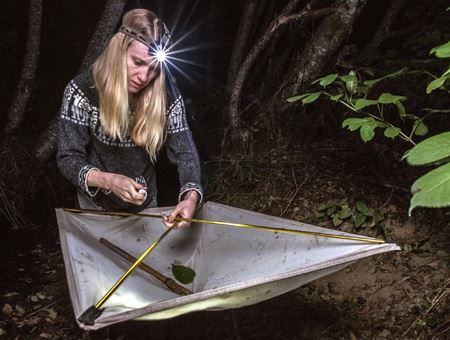
"Glaciers retreat, frogs advance: Colonization, connectivity, and contagion in a high-Andean frog"
Emma was unable to attend. She writes: "I am working in the Cordillera Vilcanota of the southern Peruvian Andes, in alpine wetlands generally between 4000 and 5400 meters above sea level. Accelerated deglaciation has opened up new upslope habitat in the Vilcanota, which three incredible amphibian species from three different families (the Marbled Four-eyed Frog, Marbled Water Frog, and Andean Toad) have rapidly colonized. Glacial melt is also melting open new "corridors" for wildlife movement across the Cordillera Vilcanota, which had for many years served as an 80-km long icy barrier across the landscape. I am interested in how these amphibians' rapid colonization of this habitat has affected their underlying genetic diversity. Given that genetic diversity is a fundamental raw material for adaptation, she is ultimately interested in how these frogs' ability to adapt to other challenges they are facing might be affected by their response to deglaciation. For example, a fungal pathogen responsible for declines in many amphibian species across the world was introduced to this site less than twenty years ago. Are frogs on the very front of this range expansion more susceptible to this pathogen? Have new movement corridors across the mountains facilitated the transmission of this pathogen into otherwise naive watersheds? As climate change causes more and more species worldwide to change their geographic distributions, and emerging infectious diseases present an ever increasing threat to global biodiversity, I hope that my research can shed light on the interaction between these pressures."
While we conduct fieldwork, our team is also engaged in outreach work with some 500 children in 6 rural communities scattered across the Vilcanota. We are conducting full-day workshops with up to 25 children at a time, focused on increasing their appreciation of amphibians, and understanding of some of the most critical environmental topics in the Andes today: climate change and mining concessions."
She also illustrated There Goes the Neighborhood!, a children's book on the ecosystem services of vultures, and Copal the Monkey and the Scarlet Macaw, a coloring book for children explaining scarlet macaw reintroduction program in Chiapas, Mexico. In addition, she was filmer and producer of four short films on a kiwi translocation project.
Her professors note that "outreach is a key part of everything she does" and that she "brings together diverse and novel approaches to bear on major questions in biodiversity science."
UC Berkeley, Mercury News, Feb 28, 2022 Spiders, slugs and seal pups:Wild things stalked for DNA
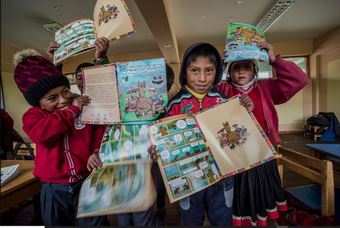 Nuestros Vecinos, la Rana y el Sapo Our Neighbors, the Frog and the Toad | 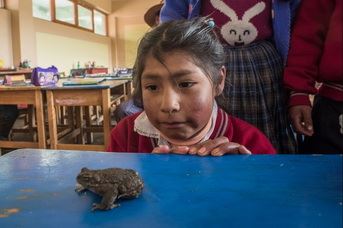 Toad |
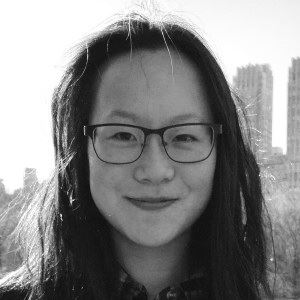 Gloria Yu, UC Berkeley, History (Hardardt award)
Gloria Yu, UC Berkeley, History (Hardardt award)"Contortions of the Will: Psychology, Human Behavior, and Moral Freedom in Nineteenth-Century Germany"
Gloria studies ideas. She wrote, "Ideas . . . shape the issues of our lives and how we talk about them. Learning their history is crucial to having informed and critical debate." Her dissertation investigates how "a dominant moral framework for assessing the Holocaust . . . emerged in the discipline of psychology . . . in nineteenth-century Germany."
Her professors note that her written work is "stellar," that she has distinguished herself "as a brilliant reader of difficult texts," and that she has a "capacious and interdisciplinary vision."
Gloria writes:
"My project generally takes place in the context of the European sciences of the brain and human behavior in the nineteenth century. Specifically, I examine nineteenth-century psychology and how the discipline of psychology has come to rely on the concepts of intelligence and behavior to investigate, first, how the human mind works and, second, what is exactly unique about the human being. The concept of the human being that emerges out of nineteenth-century psychology will have consequences for law, education, and medical treatment. My dissertation first maps out how this concept of the human being developed out of the sciences of pedagogy, physiology, and psychology in the nineteenth-century. Then, it traces how this conception of the human being is dispersed into diverse contexts: classrooms, court rooms, and armies. I'm very intrigued by the widespread popularization of the intelligence test in the early years of the twentieth century. The intelligence test became a vehicle for measuring differences in human mental capabilities, and my project tries in large part to understand how, to what end, and to what effect we have come to evaluate individuals based on their ability to perform certain mental functions."